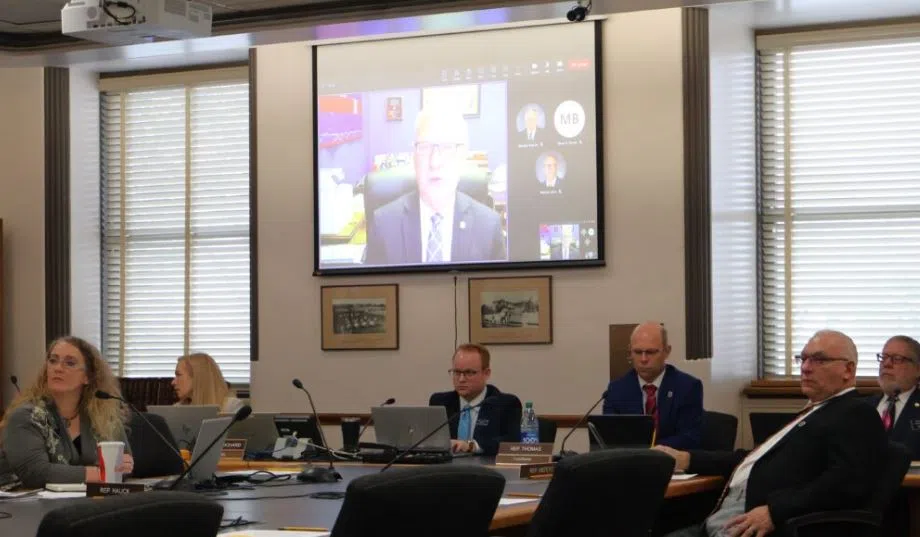
North Dakota U.S. Sen. Kevin Cramer makes comments remotely to the Legislature’s interim Agriculture and Natural Resources Committee in Bismarck on Feb. 13, 2024. (Michael Achterling/North Dakota Monitor)
BISMARCK, N.D. (North Dakota Monitor) – North Dakota U.S. Sen. Kevin Cramer on Tuesday praised the residents of Grand Forks for their protests against Fufeng, the Chinese company that wanted to build an agricultural processing plant north of the city.
Grand Forks approved letting Fufeng build a corn milling plant about 12 miles from Grand Forks Air Force Base. But resident opposition led to a federal review, an official stance by the Air Force against Fufeng ownership and ultimately a vote in 2023 by the Grand Forks City Council to abandon the project.
“For all that angst that it caused … it was a gift,” Cramer said of the Fufeng controversy. “It was a gift of how not to do things.”
Cramer, a Republican, made his remarks via video Tuesday before the Legislature’s Agriculture and Natural Resources Committee that heard two presentations on how states might keep foreign adversaries such as China from buying farmland. The committee took no action on the presentations.
Cramer began his remarks by discussing the Committee on Foreign Investment in the United States, the federal entity that reviewed the Fufeng project.
While the committee ultimately ruled it did not have jurisdiction over the Fufeng case, Cramer called the process “painfully instructive.”
“It was the Air Force that ultimately said ‘this is a problem,’ but they couldn’t say it until they were free to say it, and they weren’t free to say it until CFIUS concluded its review,” Cramer said.
He said it showed how different agencies represented on the committee, such as Homeland Security and Commerce, have different objectives that are sometimes at odds with each other.
Cramer said an agency that is not represented by a full-time member is the Department of Agriculture. He said that should change because to him, the influence of the Chinese on America’s food supply is an even bigger issue than being close to an Air Force Base.
He said the Fufeng case has led to other communities and states raising questions about foreign ownership but how states and federal agencies can work together and jurisdiction remains unclear.
“I think we have to clarify a lot of that,” he said.
North Dakota and other states are paying more attention to foreign ownership of farmland. Micah Brown of the National Agricultural Law Center said Idaho has extended its laws to cover water rights and mineral rights.
“To me that is a pretty important thing that maybe a lot of the other states, including North Dakota, should be looking at,” Rep. David Monson, R-Osnabrock, said.




Comments